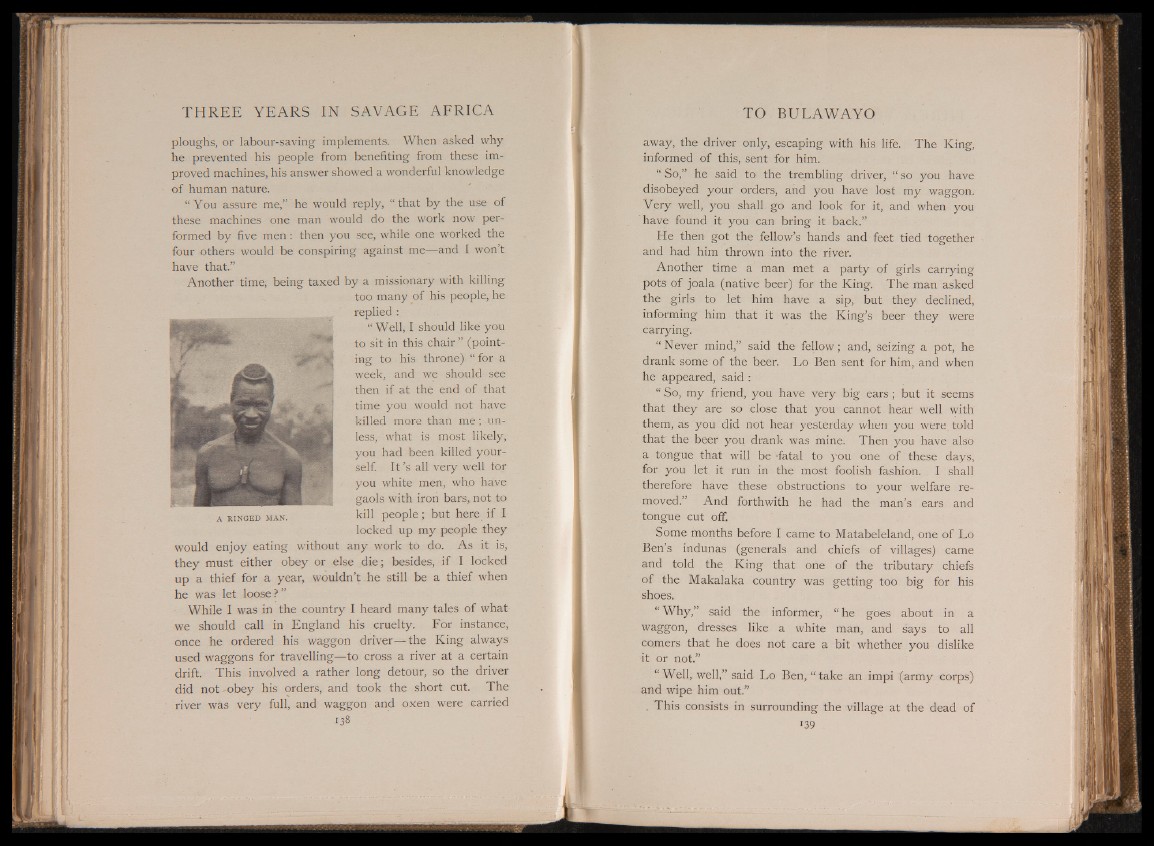
ploughs, or labour-saving implements. When asked why
he prevented his people from benefiting from these improved
machines, his answer showed a wonderful knowledge
of human nature.
“ You assure me,” he would reply, “ that by the use of
these machines one man would do the work now performed
by five men : then you see, while one worked the
four others would be conspiring against me—and I won’t
have that.”
Another time, being taxed by a missionary with killing
too many of his people, he
replied :
“ Well, I should like you
to sit in this chair ” (pointing
to his throne) “ for a
week, and we should see
then if at the end of that
time you would not have
killed more than me; unless,
what is most likely,
you had been killed yourself.
I t ’s all very well for
you white men, who have
gaols with iron bars, not to
kill people; but here if I
locked up my people they
would enjoy eating without any work to do. As it is,
they must either obey or else die; besides, if I locked
up a thief for a year, wouldn’t he still be a thief when
he was let loose ? ”
While I was in the country I heard many tales of what
we should call in England his cruelty. For instance,
once he ordered his waggon driver—the King always
used waggons for travelling—to cross a river at a certain
drift. This involved a rather long detour, so the driver
did not-obey his orders, and took the short cut. The
river was very full, and waggon and oxen were carried
138
A RINGED MAN.
away, the driver only, escaping with his life. The King,
informed of this, sent for him.
| So,” he said to the trembling driver, “ so you have
disobeyed your orders, and you have lost my waggon.
Very well, you shall go and look for it, and when you
have found it you can bring it back.”
He then got the fellow’s hands and feet tied together
and had him thrown into the river.
Another time a man met a party of girls carrying
pots of joala (native beer) for the King. The man asked
the girls to let him have a sip, but they declined,
informing him that it was the King’s beer they were
carrying.
“ Never mind,” said the fellow; and, seizing a pot, he
drank some of the beer. Lo Ben sent for him, and when
he appeared, said :
“ So, my friend, you have very big ears; but it seems
that they are so close that you cannot hear well with
them, as you did not hear yesterday when you were told
that' the beer you drank was mine. Then you have also
a tongue that will be -fatal to you one of these days,
for you let it run in the most foolish fashion. I shall
therefore have these obstructions to your welfare removed.”
And forthwith he had the man’s ears and
tongue cut off.
Some months before I came to Matabeleland, one of Lo
Ben’s indunas (generals and chiefs of villages) came
and told the King that one of the tributary chiefs
of the Makalaka country was getting too big for his
shoes.
“ Why,” said the informer, “ he goes about in a
waggon, dresses like a white man, and says to all
comers that he does not care a bit whether you dislike
it or not.”
“ Well, well,” said Lo Ben, “ take an impi (army corps)
and wipe him out.”
. This consists in surrounding the village at the dead of